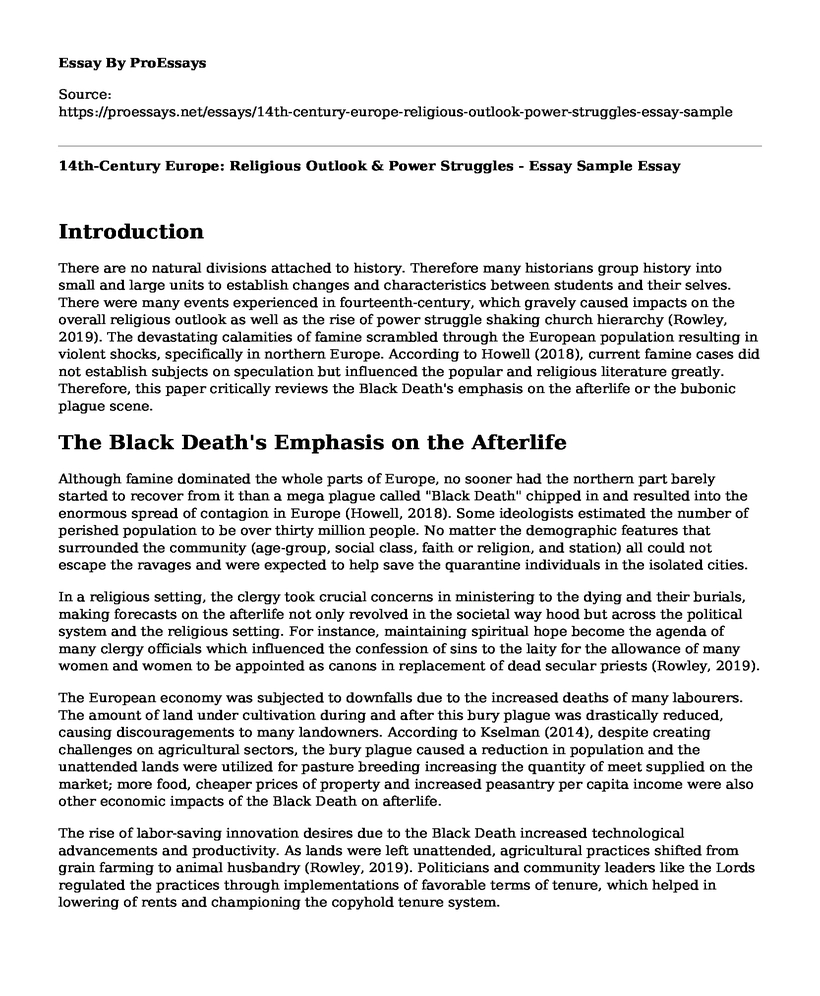Introduction
There are no natural divisions attached to history. Therefore many historians group history into small and large units to establish changes and characteristics between students and their selves. There were many events experienced in fourteenth-century, which gravely caused impacts on the overall religious outlook as well as the rise of power struggle shaking church hierarchy (Rowley, 2019). The devastating calamities of famine scrambled through the European population resulting in violent shocks, specifically in northern Europe. According to Howell (2018), current famine cases did not establish subjects on speculation but influenced the popular and religious literature greatly. Therefore, this paper critically reviews the Black Death's emphasis on the afterlife or the bubonic plague scene.
The Black Death's Emphasis on the Afterlife
Although famine dominated the whole parts of Europe, no sooner had the northern part barely started to recover from it than a mega plague called "Black Death" chipped in and resulted into the enormous spread of contagion in Europe (Howell, 2018). Some ideologists estimated the number of perished population to be over thirty million people. No matter the demographic features that surrounded the community (age-group, social class, faith or religion, and station) all could not escape the ravages and were expected to help save the quarantine individuals in the isolated cities.
In a religious setting, the clergy took crucial concerns in ministering to the dying and their burials, making forecasts on the afterlife not only revolved in the societal way hood but across the political system and the religious setting. For instance, maintaining spiritual hope become the agenda of many clergy officials which influenced the confession of sins to the laity for the allowance of many women and women to be appointed as canons in replacement of dead secular priests (Rowley, 2019).
The European economy was subjected to downfalls due to the increased deaths of many labourers. The amount of land under cultivation during and after this bury plague was drastically reduced, causing discouragements to many landowners. According to Kselman (2014), despite creating challenges on agricultural sectors, the bury plague caused a reduction in population and the unattended lands were utilized for pasture breeding increasing the quantity of meet supplied on the market; more food, cheaper prices of property and increased peasantry per capita income were also other economic impacts of the Black Death on afterlife.
The rise of labor-saving innovation desires due to the Black Death increased technological advancements and productivity. As lands were left unattended, agricultural practices shifted from grain farming to animal husbandry (Rowley, 2019). Politicians and community leaders like the Lords regulated the practices through implementations of favorable terms of tenure, which helped in lowering of rents and championing the copyhold tenure system.
Moreover, psychological effects and persecutions were also the primary shaping tools of western culture. During these frequent attempts and devastating period, the rise of irrational blames, and mental illness of the affected families became a significant issue. The absurd blame coded to specific social groups, for instance; the small villages blamed ethnic minorities, Muslims, Jews, lepers, and pilgrims (Kselman, 2014). The western culture was changed as different mechanisms like stemming violence efforts were introduce and rise of counsellors to offer psychiatric services to affected families of the bury plague.
Conclusion
Western culture recorded changes as a result of various transitioning processes and activities that took place not only in the overall nations of Europe but also across the globe. Tools that cause these changes were both impactful while others were adverse. For instance; labor-saving innovations, economic downturn as well as economic growth, death as psychological effects and the changes in religious practices helped shape the western culture.
References
Howell, M. (2018). The Low Countries in Broader Perspective. BMGN-Low Countries Historical Review, 133(1). Retrieved from: https://www.bmgn-lchr.nl/articles/10.18352/bmgn-lchr.10478/
Kselman, T. A. (2014). Death and afterlife in modern France (Vol. 122). Princeton University Press. Available online: https://books.google.com/books?hl=en&lr=&id=yzgABAAAQBAJ&oi=fnd&pg=PP1&dq=The+Black+Death%E2%80%99s+emphasis+on+the+afterlife+&ots=TZZqUK7oh-&sig=m5hEUOA2avBlDS1LU4hGR0aE5OE
Rowley, T. (2019). The High Middle Ages: 1200-1550. Routledge; retrieved from https://www.taylorfrancis.com/books/9780429059414
Cite this page
14th-Century Europe: Religious Outlook & Power Struggles - Essay Sample. (2023, Mar 25). Retrieved from https://proessays.net/essays/14th-century-europe-religious-outlook-power-struggles-essay-sample
If you are the original author of this essay and no longer wish to have it published on the ProEssays website, please click below to request its removal:
- Book Review Example. Ministering Cross-culturally: Anincarnational Model for Personal Relationships
- Agriculture Crisis as a Cause of the Great Depression Essay
- An Imagined Meeting With Mahatma Gandhi Essay
- Essay Sample on Abraham Lincoln: Contributions to US Economic, Political & Social Development
- Essay Sample on Comparing Christianity and Islam: A Historical Overview
- 20th Century American Indian Removals and Urbanization - Research Paper
- Slavery: The Backbone of British Empire in America - Essay Sample







